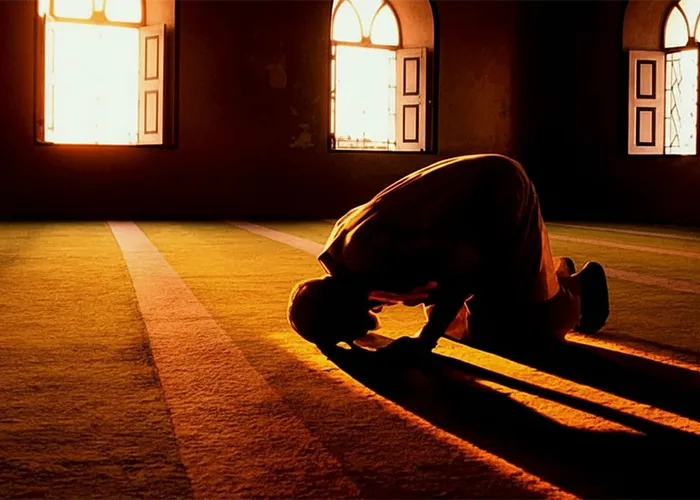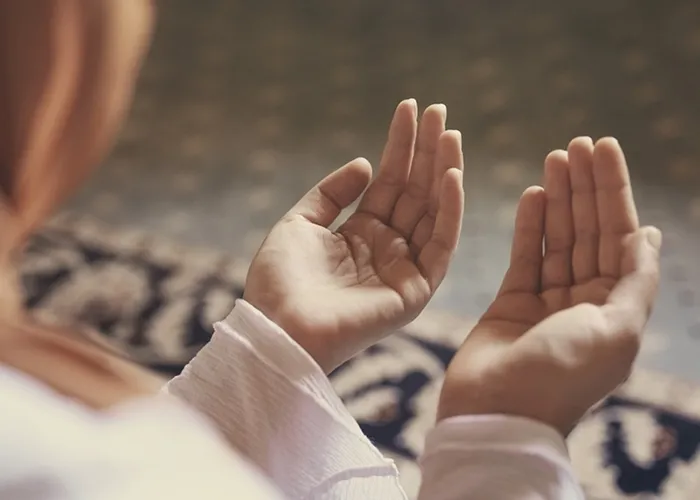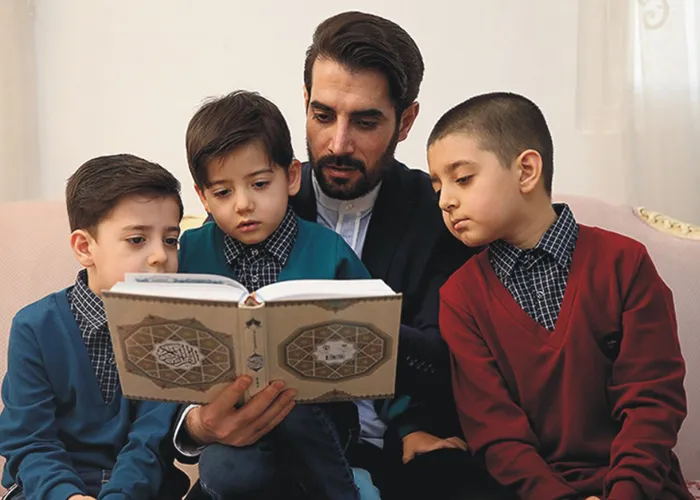Fatwa Panel of the Week – Volume02 Issue48
Obligatory Acts of Prayer
According to the fatwas of the Grand Religious Authorities: Ayatollah Sayyed Ali Khamenei, Ayatollah Sistani, and Ayatollah Makarem Shirazi (may Allah prolong their blessings):
Fatāwā presented without citing a differing opinion or a specific reference are the common rulings shared by the three respected Marāji‘. In cases where the ruling of one Marjaʿ differs from that of the other two, it is indicated in a footnote under the same number, mentioning the Marjaʿ by name.
Reciting the Testament of Faith (Tashahhud)
1. In the second unit (Rak’ah) of all prayers and in the last unit (Rak’ah), the praying person should sit after the second prostration (sajdah) and, once one’s body has become still, recite the remembrance of Allah (dhikr) for the testament of faith (tashahhud) [the two fundamental pillars of faith] which will be mentioned later. This action is called the testament of faith (tashahhud) [reciting the two fundamental pillars of faith].
2. The obligatory remembrance of Allah (dhikr) in the testament of faith (tashahhud) is:
أَشْهَدُ أَنْ لَا إِلٰهَ إِلَّا اللهُ وَحْدَهُ لَا شَرِيْكَ لَهُ، وَأَشْهَدُ أَنَّ مُحَمَّدًا عَبْدُهُ وَرَسُوْلُهُ، اَللّٰهُمَّ صَلِّ عَلَىٰ مُحَمَّدٍ وَآلِ مُحَمَّدٍ
I testify that there is no god but Allah, He alone, for whom there is no partner. And I testify that Muḥammad is His servant and His messenger. O Allah! Bless Muḥammad and the progeny of Muḥammad.
3. Before reciting the obligatory remembrance of Allah (dhikr) of the testament of faith (tashahhud), it is recommended (mustahab) to say «اَلْحَمْدُ للهِ» “Al-ḥamdu lillāh”, or to say «بِسْمِ اللهِ وَ بِاللهِ وَ الْحَمْدُ للهِ وَ خَیْرُ الْاَسْمَاءِ للهِ» “bismillāhi wa billāh walḥamdu lillāhi wa khayrul asmā’i lillāh”. It is also recommended (mustaḥab) to say after supplicating for blessings on the Prophet and his family (ṣalawāt) «وَ تَقَبَّلْ شَفاعَتَهُ وَ ارْفَعْ دَرَجَتَهُ». “wa taqabbal shafā‘atahū warfa‘ darajatah”.
4. The testament of faith is a non-rukn obligatory part of prayer. Therefore, if it is intentionally added or omitted, the prayer is invalid but inadvertently adding or omitting it does not invalidate the prayer.
5. If one who forgets to recite the testament of faith (tashahhud) and stands up for the third unit (Rak’ah) of prayer before remembering that one has not recited the testament of faith (tashahhud) before bowing (rukū‘), one must sit down, recite the testament of faith (tashahhud), stand up again, say the four remembrances of Allah (tasbīḥ) of the third unit (Rak’ah), and finish the prayer. Then, based on recommended (mustaḥab) precaution, one must perform two prostrations for the error (sajdah e sahw).
6. If one forgets to recite the testament of faith (tashahhud) and stands up before remembering this omission during or after bowing (rukū‘) in the third unit (Rak’ah) of prayer, one must finish the prayer, and after reciting the concluding salutation (salām), perform two prostrations of forgetfulness (sajdah e sahw) for the omitted testament of faith (tashahhud). Based on obligatory precaution, one should perform the redress (qaḍā’) of the missed testament of faith (tashahhud) before performing the prostration of forgetfulness (sajdah e sahw).
Ayatollah Sistani: If one remembers during or after the bowing (rukū‘), one must complete the prayer, and after the salām of the prayer — as a recommended precaution — one should make up the missed tashahhud and perform two prostrations of forgetfulness (sajdah e sahw) for the forgotten tashahhud.
The concluding salutation (Salaam)
1. The concluding salutation (salām) marks the end of the prayer. The obligatory concluding salutation (salām) of prayer is to say «اَلسَّلاَمُ عَلَیْکُمْ» “assalāmu ‘alaykum”, and it is better to add to it, «وَ رَحْمَةُ اللهِ وَ بَرَکاتُهُ» “wa raḥmatullāhi wa barakātuh”, or to say «اَلسَّلاَمُ عَلَیْنَا وَ عَلی عِبَادِ اللهِ الصَّالِحِینَ» “assalāmu ‘alaynā wa ‘alā ‘ibādillāhiṣ ṣāliḥīn”.
Ayatollah Makarem Shirazi: In the final rak‘ah of all prayers, after the tashahhud, it is obligatory to recite the salām. The salām consists of three forms:
اَلسَّلامُ عَلَيْكَ اَيُّهَا النَّبِىُّ وَ رَحْمَةُ اللّهِ وَ بَرَكاتُهُ “As-salāmu ‘alayka ayyuhan-nabiyyu wa raḥmatullāhi wa barakātuh” – “Peace be upon you, O Prophet, and the mercy and blessings of Allah.”
اَلسَّلامُ عَلَيْنا وَ عَلى عِبادِ اللّهِ الصّالِحينَ “As-salāmu ‘alaynā wa ‘alā ‘ibādillāhis-ṣāliḥīn” – “Peace be upon us and upon the righteous servants of Allah.”
اَلسّلامُ عَلَيْكُمْ وَ رَحْمَةُ اللّهِ وَ بَرَكاتُهُ» “As-salāmu ‘alaykum wa raḥmatullāhi wa barakātuh” – “Peace be upon you all, and the mercy and blessings of Allah.”
The obligatory salām is the third one, and one may suffice with it. However, sufficing with the second salām alone is problematic, while the first salām is among the recommended acts.
2. It is recommended (mustaḥab) to say «اَلسَّلاَمُ عَلَیْکَ اَیُّهَا النَّبِیُّ وَ رَحْمَةُ اللهِ وَ بَرَکاتُهُ» “assalāmu ‘alayka ayyuhan nabiyyu wa raḥmatullāhi wa barakātuh” before the two concluding salutations (salāms) mentioned above.
3. The concluding salutation (salām) is a non-rukn obligatory part of prayer. Therefore, if it is unintentionally added or omitted, the prayer is not invalidated.
4. If one forgets to recite the concluding salutation (salām) of the prayer but remembers just before the form of praying is disturbed and before either intentionally and inadvertently performing any act that invalidates the prayer, e.g., turning away from the direction of prayer (qiblah), one should recite the concluding salutation (salām), and one’s prayer is correct.
Ayatollah Makarem Shirazi: And if such an act is done before the form of the prayer is completely disrupted, the obligatory precaution is that the prayer should be repeated.
Sequence (Tartīb)
1. A praying person should observe the sequence of the acts of prayer. Therefore, if the praying person intentionally does not observe the sequence of acts in the prayer, e.g., if one recites the second chapter (surah) before Chapter (Surah) al-Fātiḥah, or if one performs the two prostrations (sajdah) before bowing (rukū‘), one’s prayer is invalid.
2. If one forgets to perform a foundational element (rukn) and starts the next one, e.g., if one forgets to perform the two prostrations (sajdah) and realizes it during the bowing (rukū‘) of the next unit (Rak’ah), one’s prayer is invalid.
Ayatollah Sistani: If one forgets an essential pillar (rukn) of the prayer and performs the subsequent pillar afterward — for example, if one performs the two prostrations (sujūd) before bowing (rukū‘) — then the prayer is, as a matter of obligatory precaution, invalid.
3. If one forgets to perform a foundational element (rukn) and performs the following non-foundational element before starting the next foundational element (rukn), one must perform the missed foundational element (rukn) and then perform the obligatory acts which follow. For example, if one forgets to perform the two prostrations (sajdah) and recites the testament of faith (tashahhud) [the two fundamental pillars of faith], and then remembers that one has not performed the two prostrations (sajdah), one should perform the two prostrations (sajdah) and then repeat the testament of faith (tashahhud) [the two fundamental pillars of faith].
4. If a person mistakenly performs a foundational element (rukn) before a non-foundational element, e.g., if one forgets to recite Chapter (Surah) al-Fātiḥah and realizes it in bowing (rukū‘), one’s prayer is correct; one cannot go back to recite Chapter (Surah) al-Fātiḥah.
5. If a person forgets to perform a non-foundational element, performs the next non-foundational element, and then realizes it before starting the next foundational element (rukn), e.g., if one forgets to recite Chapter (Surah) al-Fātiḥah and recites the other chapter (surah), but realizes it before bowing (rukū‘),one should recite what one has missed (e.g., Chapter [Surah] al-Fātiḥah) and then repeat what one has recited earlier by mistake (e.g., the other chapter (surah).
editor's pick
news via inbox
Subscribe to the newsletter.




